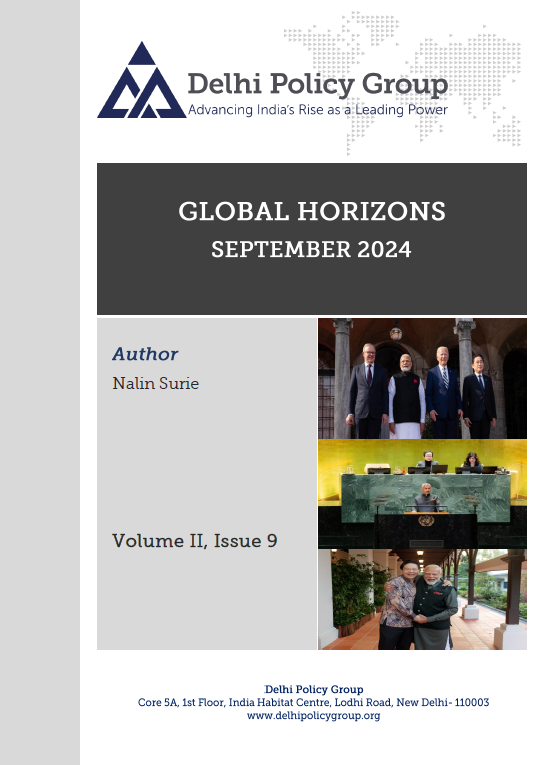Global Horizons
Date: October 05, 2024
September 2024 was a month of contradictions, in which the de-facto breakdown of the international political order co-existed with the expressed desire of nations to keep alive and reform the multilateral system represented by the United Nations.
In this issue, the author begins by reviewing developments in the Middle East, where Israel shed all restraints in pursuing military actions against Hamas and Hezbollah, as well as in the West Bank. Israeli PM Netanyahu was defiant in his warnings to all enemies, including Iran. The UN system stood by as a mute spectator, while the US strengthened its military presence in the region to support Israel.
As expected, Iran reacted to Israeli actions by launching almost 200 ballistic missiles against Israel, which were intercepted with US assistance. How Israel and the US will react to this provocation may determine whether there will be a wider conflagration in the region, which will carry major repercussions for India.
Meanwhile, the conflict in Ukraine continued, even though there were signs that both Russia and Ukraine seem to want a way out to end the war.
Crises and conflicts are also festering across the globe, from Sudan to Venezuela, Myanmar to the South China Sea. These are being compounded by uncertainty over the outcome of the US presidential election due in November.
The UN Summit of the Future was marked by a serious effort, particularly by the Global South, to sustain multilateralism and keep the UN alive, even though outcomes largely represented compromise formulations on a wide spectrum of issues addressed. One positive outcome was the adoption of the Global Digital Compact.
President Xi hosted African leaders at the 9th Forum on China-Africa Cooperation on September 5, elevating relations, announcing projects for development cooperation and infrastructure, and showcasing China’s flagship initiatives – GDI, GSI and GCI.
At celebrations marking the PRC’s 75th anniversary, President Xi reiterated “complete reunification” with Taiwan as an irreversible cause. China also announced financial and monetary measures to mitigate deflationary pressures in its economy.
September was a particularly active month for Indian diplomacy. In its immediate neighbourhood, India was engaged constructively in managing the evolving situation in Bangladesh, as well as significant political change in Sri Lanka.
Apart from a flurry of high-level meetings at the UNGA, PM Modi attended a Quad Summit hosted by President Biden, as well as an India-US bilateral summit.
The Quad’s Wilmington Declaration affirmed that its members were more strategically aligned than ever before, and that they had built “a vital and enduring regional grouping that will buttress the Indo-Pacific for decades to come.” The declaration was also marked by clarity of shared positions on regional and global issues, including the importance of upholding international law in the South China Sea.
PM Modi continued India’s outreach to ASEAN through visits during the month to Brunei and Singapore. The Crown Prince of the UAE visited India, further strengthening this important partnership in the Gulf.
To read this Global Horizons, Vol. II, Issue 9, please see the PDF attached.
In this issue, the author begins by reviewing developments in the Middle East, where Israel shed all restraints in pursuing military actions against Hamas and Hezbollah, as well as in the West Bank. Israeli PM Netanyahu was defiant in his warnings to all enemies, including Iran. The UN system stood by as a mute spectator, while the US strengthened its military presence in the region to support Israel.
As expected, Iran reacted to Israeli actions by launching almost 200 ballistic missiles against Israel, which were intercepted with US assistance. How Israel and the US will react to this provocation may determine whether there will be a wider conflagration in the region, which will carry major repercussions for India.
Meanwhile, the conflict in Ukraine continued, even though there were signs that both Russia and Ukraine seem to want a way out to end the war.
Crises and conflicts are also festering across the globe, from Sudan to Venezuela, Myanmar to the South China Sea. These are being compounded by uncertainty over the outcome of the US presidential election due in November.
The UN Summit of the Future was marked by a serious effort, particularly by the Global South, to sustain multilateralism and keep the UN alive, even though outcomes largely represented compromise formulations on a wide spectrum of issues addressed. One positive outcome was the adoption of the Global Digital Compact.
President Xi hosted African leaders at the 9th Forum on China-Africa Cooperation on September 5, elevating relations, announcing projects for development cooperation and infrastructure, and showcasing China’s flagship initiatives – GDI, GSI and GCI.
At celebrations marking the PRC’s 75th anniversary, President Xi reiterated “complete reunification” with Taiwan as an irreversible cause. China also announced financial and monetary measures to mitigate deflationary pressures in its economy.
September was a particularly active month for Indian diplomacy. In its immediate neighbourhood, India was engaged constructively in managing the evolving situation in Bangladesh, as well as significant political change in Sri Lanka.
Apart from a flurry of high-level meetings at the UNGA, PM Modi attended a Quad Summit hosted by President Biden, as well as an India-US bilateral summit.
The Quad’s Wilmington Declaration affirmed that its members were more strategically aligned than ever before, and that they had built “a vital and enduring regional grouping that will buttress the Indo-Pacific for decades to come.” The declaration was also marked by clarity of shared positions on regional and global issues, including the importance of upholding international law in the South China Sea.
PM Modi continued India’s outreach to ASEAN through visits during the month to Brunei and Singapore. The Crown Prince of the UAE visited India, further strengthening this important partnership in the Gulf.
To read this Global Horizons, Vol. II, Issue 9, please see the PDF attached.



